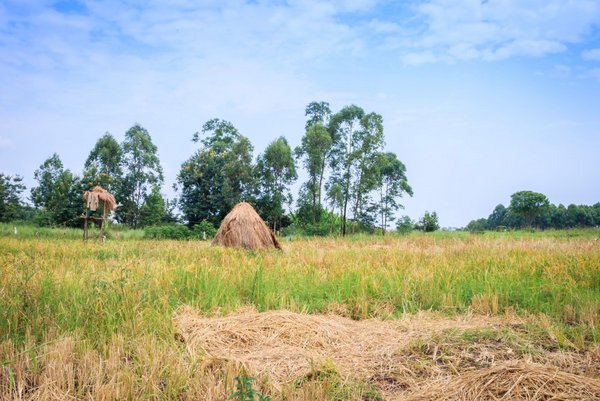 Read this article in French
Read this article in French- Share this article
- Subscribe to our newsletter
New rice lines for Africa offer virus protection
RYMV is an RNA virus spread by beetles and direct leaf-to-leaf contact. In Africa, where the majority of producers farm plots of land barely one hectare in size, between ten and one hundred per cent of the rice harvests are regularly lost to this virus, making it a life-threatening problem for the poorest farmers.
There is no effective protection against the virus. “The only real protection is to develop rice varieties that possess a resistance gene against RYMV, which would make the plant invulnerable,” says Dr Yugander Arra from HHU, and lead author of the study published in Plant Biotechnology Journal last December. A research team from the Institute for Molecular Physiology at HHU (headed by Professor Dr Wolf B. Frommer) and the Institut de recherche pour le développement (IRD) in Montpellier, France, has developed such resistant rice lines.
Breeding resistant locally adapted varieties for small-scale farmers
The rice varieties, the development of which the team describes in the Plant Biotechnology Journal, are a preliminary step towards being able to generate resistant locally adapted elite varieties for small-scale food producers in Africa.
Three resistance genes are currently known; mutations in just one of the genes, called RYMV1, 2 and 3, are sufficient to achieve resistance. The resistant form rymv2 occurs in poor-yielding African rice (Oryza glaberrima) varieties.
RYMV2, also known as CPR5.1, encodes an important protein from the pores of the cell nucleus. In the model plant Arabidopsis thaliana, the loss of the only gene copy of CPR5 results in a broad spectrum of resistance not only to viruses, but also to bacteria and fungi. However, growth is severely restricted, the plants exhibit spontaneous lesions, and they produce low yields. So it was important to test whether rymv2 resistance could be transferred to other rice varieties without negative consequences.
In Africa, other high-yield rice varieties based on the Asian species Oryza indica are mainly used and these do not have the resistance gene. Inserting the relevant gene is however not a particularly promising approach, as the descendants of such “inter-species” hybrids are highly sterile and therefore cannot reproduce and pass on the resistance easily.
Using the CRISPR/Cas genome editing method, the research group has now shown that mutations of the RYMV2 gene can be produced in an Asian rice variety that make it resistant to the virus in a similar way to the African form. In the next step, the aim is to edit relevant African elite varieties in the same way in order to then make them available to African small-scale producers. Helping these farmers is the goal of the international research consortium “Healthy Crops”, which is headed by HHU.
(HHU/wi)
Reference:
Arra, Y., Auguy, F., Stiebner, M., Chéron, S., Wudick, M.M., Miras, M., Schepler-Luu, V., Köhler, S., Cunnac, S., Frommer, W.B. and Albar, L. (2023); Rice Yellow Mottle Virus resistance by genome editing of the Oryza sativa L. ssp. japonica nucleoporin gene OsCPR5.1 but not OsCPR5.2; Plant Biotechnol. J.; December 2023 DOI: 10.1111/pbi.14266





Add a comment
Comments :
Do you have an solution or varieties of maize that are resistance to the worms ?